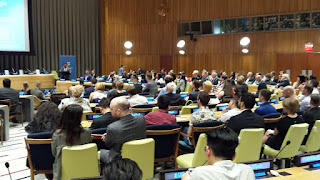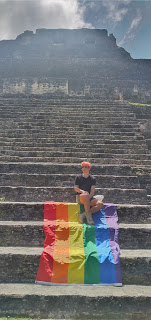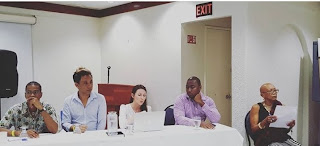The Brunei Effect in L.G.B.T.I Global Advocacy
7/4/2019
Celebrities announced a boycott when Brunei announced its was making gay sex punishable by flogging, or stoning to death. Companies added their voice like TV Choice Magazine, Deutsche Bank, STA Travel and Virgin Australia which has cut a staff travel agreement with the airline. UN rights chief Michelle Bachelet added her voice to the list of condemnation, "I appeal to the government to stop the entry into force of this draconian new penal code, which would mark a serious setback for human rights protections for the people of Brunei if implemented."
The condemnation of Brunei anti-gay law was done rightfully so, but within the context of a boarder reality in our environment. A guardian article in 2017 points out that developing countries receives $1.3 trillion in income, aid and investment, but send out $3.3 trillion in 2012 with $16.3 trillion drained out of developing countries in the pass few decades.
The false accounting in the international poverty line is interesting for MDG 1 was reported to have been influenced in the following way,"they moved the starting point of analysis from 2000 back to 1990, thus retroactively claiming all of the poverty reduction accomplished by China during the 1990s. These changes mean that the original goal of drawing 836 million people out of poverty has been whittled down to 345 million." A 2013 article from global policy points out,"Developing countries receive about $136 billion in aid from donor countries each year. At the same time, however, they lose about $1 trillion each year through offshore capital flight, mostly in the form of tax avoidance by multinational corporations. That’s nearly 10 times the size of the aid budget." Interestingly enough, it was British Prime Minister Theresa May in 2018 who summarized the intent of her nation's use of AID which was, " to promote British trade and political interest." The point is made when The five poorest countries per capita are Democratic Republic of Congo, Mozambique, Uganda, Tajikistan and Haiti are not even in the top ten of recipients, but Pakistan, Syria, Ethiopia, Nigeria and Afghanistan. The countries who are in the top 10 recipients are primarily either significant markets, such as Nigeria, visited by May last week, or of geopolitical importance, particularly for the “war on terror” – Pakistan, Afghanistan, Syria. For the US the same hold true, most aid goes instead to Israel, Egypt, Jordan, Afghanistan and Kenya, again for reasons of geopolitics and trade.
Celebrities announced a boycott when Brunei announced its was making gay sex punishable by flogging, or stoning to death. Companies added their voice like TV Choice Magazine, Deutsche Bank, STA Travel and Virgin Australia which has cut a staff travel agreement with the airline. UN rights chief Michelle Bachelet added her voice to the list of condemnation, "I appeal to the government to stop the entry into force of this draconian new penal code, which would mark a serious setback for human rights protections for the people of Brunei if implemented."
The European Union added its voice with,"Some of the punishments foreseen in the criminal code amount to torture, acts of cruel, inhuman or degrading treatment,"It has drawn strong criticism from the United Nations High Commissioner for Refugees, the United States, Germany, France and Britain. Amnesty International added their voice as well.
My Colleague Pang Khee Teik from Malaysia points out," As an LGBT rights activist working in Malaysia, I am disturbed by this global trend of reporting which gives the impression that the killing of gay people is the only crime worth the outrage. Should we not be equally outraged by amputation of limbs, death for apostasy, whipping of children, and other crimes against humanity?" He makes a strong point about how we selectively pick our battles as a movement across the world. His comments amplifies global philosophical questions, as a Global movement, are we being complicit in the promotion of inequity of rights violations or does putting a spotlight on L.G.B.T.I rights violation offer an opportunity to impact discussions about other violations? A debatable point for any reader.
Many progressive countries have issued statements of condemnation which exists within a delicate context that generates a political dance of competing global attention ranging from Crimes against humanity to the Global L.G.B.T.I movement efforts to mitigate or prevent suffering. We saw the Genocide in Rwanda (1994) with an estimated 800,000 were killed in 100 days; South Sudan civil war that displaced 1,000,000 people (2013);The Rohingya with 700,000 fleeing their homes (2018) reports.
Moving to other regions of the world, The UN Office for Coordination of Humanitarian Affairs points out of the 2,200 victims of the 2014 massacre in Gaza, 67% of those killed were civilians. With seven decades of occupation 9,560 being killed vs 1,248 Israelis between 2000 and 2018. It can be declared coldly, that every part of the world has its problems of blood letting in its governance. This hold no comfort to an estimated 40 million experiencing slave labor in 2016 with child labor accounting for 152 million. Added to this, when an estimated 24.9 million has been victims of human trafficking in 2017 it becomes an overwhelming matter. The competing agendas of human suffering is wide and each group seems to be vying for attention on the world stage. This includes the Global L.G.B.TI Movement in its effort to advance rights around the world and in getting UN systems to visibilise our concerns. Lost in translation is the global reality in our movement is war and economic policies which help to advance or undermine our progress as a social group.
A newsweek report points out that the US has spent an estimated $ 5.6 trillion on War since 2001 that have led to an estimated 500,000 death. the doctors without borders annual report comments," a third of MSF projects are in places locked
in armed conflict, with major humanitarian operations in Democratic Republic of Congo (DRC), South Sudan, Central African
Republic, Iraq, Syria, and Afghanistan. In 2017, several of these
conflicts grew even more acute, with parties routinely violating
the rules of war intended to protect civilians." In simple terms, civilians are expendable! When the issue of refugee is explored further, we hear about asylum seekers from the L.G.B.T.I population trapped in refugee camps in Kenya, the migrant caravans in Central America and the recent Chechnya horror stories. But this is not an article about America War investment or refugees problems, because the data points out that every develop country has investments that in the end serves their best interest. To forget China and its 1,000,000 Uyghurs detention and its debt trap policies is to ignore one basic premise, Global L.G.B.T.I issues exists within a power structure that activists across the world have to navigate. Everyone knows it, but few are in a place of power and influence to speak about it all. In practical terms, there might be no strategic value in L.G.B.T.I Global discussion. But who raises the bar of such discussions, especially on places like Brunei?
In 2017 a report about Africa points out $162bn arrives in Africa but $203bn leaves the continent, noting that "illicit financial flows" amount to 6.1% of the continent entire gross domestic product or three times what africa receives in aid. The indirect impact means wealth pulled out of Africa includes estimates that $29bn a year is being stolen from Africa in illegal logging, fishing and trade in wildlife while $36bn is owed to Africa as a result of the damage of Climate change. A key observation is, that no government in any corner of the world has said, climate change nor economic development issues impacts only their straight citizens. They speak simply of their citizenry. It in this light, I make the point that the Global L.G.B.T.I movement intersects many issues, but we struggle to integrates economic empowerment and diversity with our Civil Rights concerns and have failed to developed any significant strategy that address development strategies that reflect the realities of large and small countries alike.
The false accounting in the international poverty line is interesting for MDG 1 was reported to have been influenced in the following way,"they moved the starting point of analysis from 2000 back to 1990, thus retroactively claiming all of the poverty reduction accomplished by China during the 1990s. These changes mean that the original goal of drawing 836 million people out of poverty has been whittled down to 345 million." A 2013 article from global policy points out,"Developing countries receive about $136 billion in aid from donor countries each year. At the same time, however, they lose about $1 trillion each year through offshore capital flight, mostly in the form of tax avoidance by multinational corporations. That’s nearly 10 times the size of the aid budget." Interestingly enough, it was British Prime Minister Theresa May in 2018 who summarized the intent of her nation's use of AID which was, " to promote British trade and political interest." The point is made when The five poorest countries per capita are Democratic Republic of Congo, Mozambique, Uganda, Tajikistan and Haiti are not even in the top ten of recipients, but Pakistan, Syria, Ethiopia, Nigeria and Afghanistan. The countries who are in the top 10 recipients are primarily either significant markets, such as Nigeria, visited by May last week, or of geopolitical importance, particularly for the “war on terror” – Pakistan, Afghanistan, Syria. For the US the same hold true, most aid goes instead to Israel, Egypt, Jordan, Afghanistan and Kenya, again for reasons of geopolitics and trade.
The point of highlighting economic data or war, or specific countries policies is not for the reader to agree, but to challenge the reader to think deeply about structures that are created in international spaces. Whether it's the Organizations of American States, the UN Human Rights Council or the Equal Rights Coalition and how they work for the everyday citizen, especially LGBTI individuals living around the world. It is to challenge the reader to reflect on solutions and to think about the Global L.G.B.T.I movement as a mechanism for potentially redistributing resources directly to CSO mobilising around civil rights or liberation frameworks; to state agencies to invest in human rights institutions and legal frameworks that leaves no one behind and to recognise that despite the World's problems there is hope. For activists around the world, whether person dealing with Human Trafficking, Slave and Child Labour, Violence Against Women and Girls, Genocide, ethnic cleansing or L.G.B.T.I issues on the Global Stage, have shown that its the people who feel the pain on the ground that is driving the solution to act. LGBTI activists in Latin America, have shown the way, pushing legislative reform on L.G.B.T.I issues, despite dictatorships and societal violence. Europe have shown the way as well. Still in a Global economy that generates an estimated 80 trillion in gross domestic product, small countries like Belize do not exists, nevertheless offers lessons to navigate existing power structures on L.G.B.T.I. issues, especially among commonwealth states.
Still we must not forget that its blood of people in the past that have forced mobilization and advocacy around LGBTI issues, more will be spilt before we succeeded in making L.G.B.T.I issues around the world a non issue. Brunei will remains an interesting case, its in the South and its rich, its certainly not Tanzania. Will Brunei become last week news? we shall see, until then. The struggle continues!
Source:
https://www.apnews.com/a5e0748b9b7443e683c6a0f4e0c7d509
https://blogs.mediapart.fr/jecmaus/blog/300114/franceafrique-14-african-countries-forced-france-pay-colonial-tax-benefits-slavery-and-colonization
https://www.bbc.com/news/world-africa-41094094
https://www.bbc.com/news/world-asia-41566561
https://www.crisisgroup.org/africa/horn-africa/south-sudan/south-sudan-civil-war-any-other-name
https://www.theguardian.com/commentisfree/2018/oct/11/grandfather-nelson-mandela-apartheid-parallels-israel-palestinian
https://ifamericaknew.org/stat/deaths.html
https://www.doctorswithoutborders.org/sites/default/files/2018-12/MSF-USA%20Annual%20Report%202017%20web.pdf
http://www.unwomen.org/en/what-we-do/ending-violence-against-women/facts-and-figures
https://www.humanrightsfirst.org/blog/closer-look-new-global-estimates-prevalence-human-trafficking-2017
https://www.ilo.org/global/about-the-ilo/newsroom/news/WCMS_574717/lang--en/index.htm
https://www.aljazeera.com/indepth/opinion/2017/05/africa-poor-stealing-wealth-170524063731884.html?fbclid=IwAR2n548popDH-hyPASmAp-5QFMfAuLchh5osmc6lv1NR8NuhHPa5c_kSmp0
https://www.washingtonpost.com/news/global-opinions/wp/2018/08/27/chinas-debt-traps-around-the-world-are-a-trademark-of-its-imperialist-ambitions/?noredirect=on&utm_term=.8890f9485fb6
http://theconversation.com/explainer-who-are-the-uyghurs-and-why-is-the-chinese-government-detaining-them-111843
https://www.visualcapitalist.com/80-trillion-world-economy-one-chart/?fbclid=IwAR3XfaMQPERU6EL7wRuBAYU7Ci4osxfrjSApwcxk1467VFb5g5hzdMPwPYg
https://blogs.mediapart.fr/jecmaus/blog/300114/franceafrique-14-african-countries-forced-france-pay-colonial-tax-benefits-slavery-and-colonization
https://www.bbc.com/news/world-africa-41094094
https://www.bbc.com/news/world-asia-41566561
https://www.crisisgroup.org/africa/horn-africa/south-sudan/south-sudan-civil-war-any-other-name
https://www.theguardian.com/commentisfree/2018/oct/11/grandfather-nelson-mandela-apartheid-parallels-israel-palestinian
https://ifamericaknew.org/stat/deaths.html
https://www.doctorswithoutborders.org/sites/default/files/2018-12/MSF-USA%20Annual%20Report%202017%20web.pdf
http://www.unwomen.org/en/what-we-do/ending-violence-against-women/facts-and-figures
https://www.humanrightsfirst.org/blog/closer-look-new-global-estimates-prevalence-human-trafficking-2017
https://www.ilo.org/global/about-the-ilo/newsroom/news/WCMS_574717/lang--en/index.htm
https://www.aljazeera.com/indepth/opinion/2017/05/africa-poor-stealing-wealth-170524063731884.html?fbclid=IwAR2n548popDH-hyPASmAp-5QFMfAuLchh5osmc6lv1NR8NuhHPa5c_kSmp0
https://www.washingtonpost.com/news/global-opinions/wp/2018/08/27/chinas-debt-traps-around-the-world-are-a-trademark-of-its-imperialist-ambitions/?noredirect=on&utm_term=.8890f9485fb6
http://theconversation.com/explainer-who-are-the-uyghurs-and-why-is-the-chinese-government-detaining-them-111843
https://www.visualcapitalist.com/80-trillion-world-economy-one-chart/?fbclid=IwAR3XfaMQPERU6EL7wRuBAYU7Ci4osxfrjSApwcxk1467VFb5g5hzdMPwPYg





Comments
Post a Comment